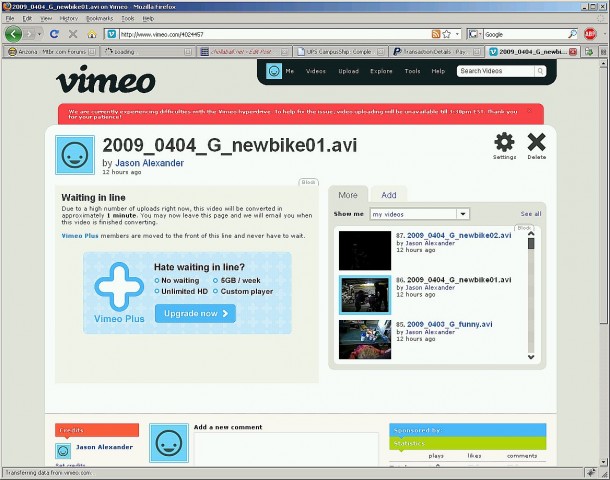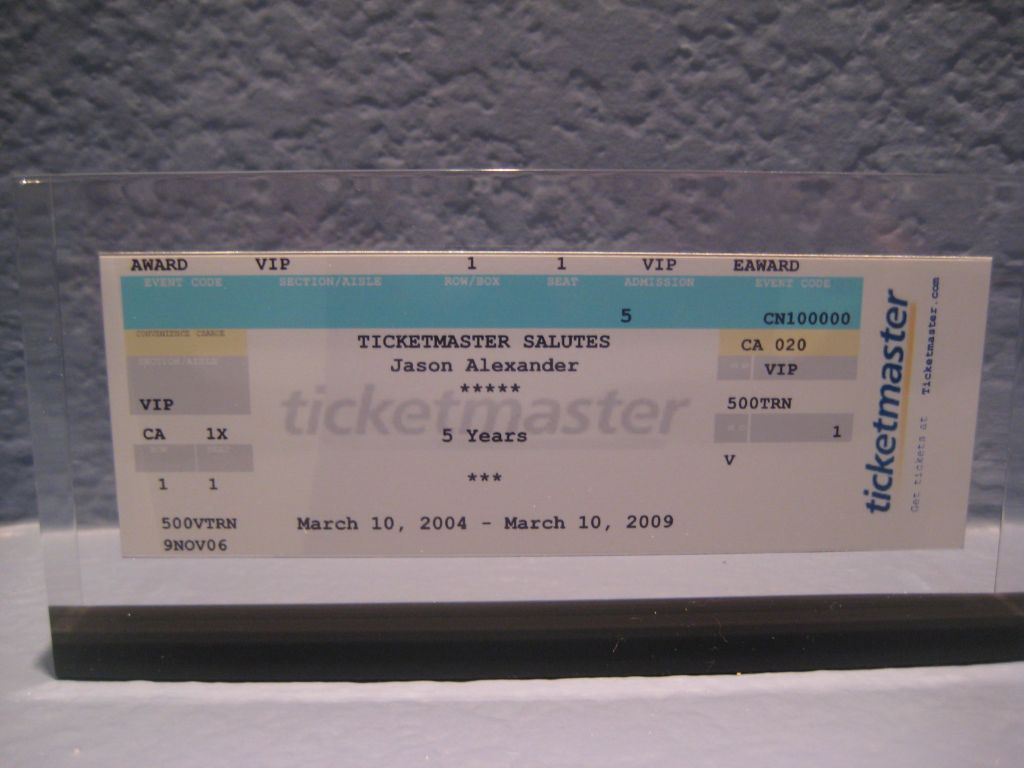Tim Armstrong – Wake Up
Fishbone – Lyin-Ass-Bitch
These songs are here for no other reason than I like em, and I stole em, i luv skapunk, and this post needs some background music.
I have never felt any guilt over getting all my mp3s online or copies from friends. Its not that I believe stealing is ok, even if you can’t get caught. I just have a hard time seeing it as stealing. The items are out there on the internet with accessible and fast dl’s, available like sunlight, I am making a copy of a copy of an infinite number of copies, and my act is not harming anyone or taking a finite resource that costs money to produce. Moral arguments say that I am harming the artist who’s work I did not buy, and I am using the copyright holder’s product without their permission. But quantifying the actual harm I have done, convincing me that the internet is not the public domain, and me using it only personally and not to make money cast significant doubt on these moral arguments for me. I know its something I’m being asked not to do, but getting from there to piracy is a leap I just can’t make.
The most convincing thing for me that “stealing” music is not wrong is that the record companies do not protect their software. I’m not talking about not getting caught, which is almost impossible with P2P networks anyway, I’m talking about no security whatsoever. I’ve never worked on software that did not include some security measures, its just inconceivable that in the digital age you would sell a digital product that is unprotected. The record companies have made lawsuits the backbone of their business model, rather than adapt their product to changing times. This has been the record companies’ strategy for years – from cassettes, to CDs, to DATs, and now to mp3s. Whine about the threat of new technology, make us feel bad about ourselves for using it, and then sue. This fight with technology has been 20 years in the making, and they have yet to evolve their product or strategy. Its not like all of a sudden ipods and the internet showed up – I got my first mp3 player in 1999! I just can’t abide by morality that is frozen in time while the notion of piracy struggles to maintain validity on the internet.
A recent conversation made me re-evaluate two considerations: is music such a different type of ware that it should be subject to different morality than other digital products, and, I have a long history of both music copying and wares piracy – perhaps this is just an elaborate justification for my selfish actions? Understanding the latter helps clarify the former.
As long as I can remember, I copied music. It used to be holding a tape recorder up to the radio, then duping tapes, then taping CD’s, then burning CD copies. These were all slow, burdensome, required borrowing the media, and still cost you $1-2 for tapes or CD’s. The quality wasn’t as good, and it was limited by the time, effort and expense of copying. My anecdotal opinion is that it was self-limiting, and not a big impact to the music industry. No one I ever met had a problem with the morality of it, maybe cause no one had a problem with the morality of it, maybe cause your one individual act had such a minimal impact on the industry and was kinda a pain in the ass. Piracy? Bootleg? Whatever – it was just a copy to use for myself. In the late 90’s Beckie and I had about 400 CDs, and probably 200 hundred albums on tape. A lot of the CDs were bought used, or from Columbia House 15 for a penny. My music collection doubled and tripled when I worked Tech Support for RightFAX, and we had a room full of 20 guys all sharing their music and making copies off each other. It didn’t feel any different than my college roommates and I copying CD’s. It didn’t feel much different than 1 guy choosing the tape we’d listen to for awhile, then someone else playing one of theirs, etc.
Gradually this led to membership or access-controlled sites that basically were an FTP download from a stranger, which gradually led to Napster. It felt no different than sharing with people you knew – the “criminal” act had not changed one bit, nor how I used it as a personal copy. These early file sharing networks caused a huge increase in illegal copies compared to the current number of illegal copies aka tapes, but my unsubstantiated hunch is it was still mostly by the geeks and college students, based on all the people I knew who still stuck with CD’s or mp3 versions of their CD’s, willfully turning down access to my now-huge collection cause it was too new too different too much bother. Whomever was doing it, it was not P2P, it was centralized and it was traceable. The copyright holders had a target, and they could prove the offense. Score one for the record companies. If you are one of those all-music-should-be-free crusaders, this is where you’d play The Emperor’s Theme from “The Empire Strikes Back.”
Over the next few years the file-sharing client programs came and went, morphing with different technologies and fighting different legal strategies by the record companies, so fast i don’t even remember the names. What I do remember is that it got harder and harder to get music, especially to find an entire album since you had to track down each song file individually. Those you found were often bogus, the sites slow or full of viruses, and you were left with mis-matched tags and frequencies. I’d say during these years 85% of my new music was hitting up friends and co-workers, having my own private FTP server that I let about 10 friends share on, or 50 free dls per credit card from Emusic.com, all nothing fundamentally different than I had been doing for years. The albums I did gank from the net were more a hobby cause I was spending all day on the computer anyway, getting them was not a cost-effective use of my time, I didn’t want em bad enough to pay $10 I just had more time and boredom than any thing else. I spent about 30 hrs one month just sanitizing and re-tagging our entire collection it was such a mishmash.
The death of Napster eventually led to more money for the owners of digital music, and less. On the one hand, the average computer user who knew nothing about how to download free music began using the internet, enough people got tired of how much of a pain in the ass it was to go after free music, iTunes and similar started offering affordable and legal downloads that were easy and high-quality, and many artists started giving their music away on their own. Price, convenience, and value led to new products and services, new artists producing and distributing their own products, change and evolution, less piracy. On the other hand, true P2P networks also evolved where it was untraceable and easier than ever before to get whatever you wanted. Complete temptation as one option, easy and legal and affordable music as the other option.
Up to the point of total free access via new P2P networks, I think this evolution of free music usage has many similarities to my use of pirated wares. They used to be easy to get, then the sites became so full of viruses and bogus versions they became hard. Cracks and licenses used to be easy and effective, then the programmer’s made the licensing tougher and more resilient in spotting re-used activation codes. The costs became reasonable, bundling things with new purchases and discounted renewals became commonplace, and personal licenses or comparable freeware version developed. For example, you used to be able to obtain copies of PhotoShop pretty much anywhere. Then it became harder to get for free, the cracked versions started expiring regularly and you could find copies of the almost-as-good Paint Shop Pro anywhere, which beget Paint.Net, and so on. (an aside: what I can do now for free with graphics vs. 10 years ago for free is the difference between 90% of Photoshop and MS Paint, but that is a post about trickling down technology for another day). I once re-installed Norton AntiVirus every 3 months for a year while each time resetting my system clock, until that just became a total waste of time for the cost of a license. At least for me, it just became easier to buy things or find comparable with freeware.
The fact that I was making an effort to hack or pirate a program definitely entered my calculations of right and wrong, but not for any respect for a copyright. Working in software development — or IT or Web Design or many other computer fields — you have so much access to software from vendors, suppliers, eval licenses, beta programs, user groups, tutorials, blogs, etc that using whatever whenever is part of your daily grind. You’re not reselling it, or using it commercially for very long without a license, or are particularly wedded to one thing or another. There is always another tool, often this just happens to fit your need at the moment and your convenience. Seeing how your own products are passed around, evaluated and demoed makes you see how a few free copies are not significant – the real money is selling a product over and over to people not able to make it work on their own, not fighting the geeks going above-and-beyond to use an unlicensed and unsupported version. This is how I end up with lots of programs I didn’t pay for. Eventually you need the tool again, and now you’re used to using it, and you don’t want to waste time learning or searching for a new tool when it’d be easier to track down a crack or a license, or pay for it when you’ve been using it for free already. Somewhere in here it either continues to be easy to use for free, or you realize that you are working too dang hard to steal something to tell yourself anymore that you are not stealing something. So you find a new free tool or pay up. The morality against stealing is brought to life by the security.
The model is the same on a corporate level, but the bite of security is felt far more. Companies were the first to realize they were big fat targets for disgruntled employees if they did not license their software. The best conspiracy is a conspiracy of one. Most network users nowadays can’t do a whole lot to their machines, which puts control and risk management in the hands of the SysAdmins. Even in most of the software companies I’ve been at, where the users need flexibility and control to kick around their systems, unauthorized products don’t last past the first few nightly system audits anymore. The SysAdmin for a computer company has to have enough finesse not to throw the baby out with the bathwater, so instead of locking out your privileges he will give you a nudge nudge wink wink submit a PO for the software at your earliest convenience please. An example: I wanted to use a free virus scanner that I use on my machines at home, that our SysAdmin uses, and that was less intrusive than the McAfee suite that is our corporate standard. I was told after an audit revealed it on my machine I could not use it since it was a work computer, that my usage violated AVG’s license agreement for the free version. Self-enforcement and adhering to licensing became cost effective for companies. But at the same time, products offered eval periods, pricing became competitive and budgeted for, time delays and ramp-up periods were built into schedules. The corporate culture evolved to provide better alternatives to piracy. The licensing that was a pain in the ass for me avoid for personal usage, which forced me to acknowledge my unapproved actions, found a lukewarm champion in the corporate SysAdmin and all his Dilberts that sneak posts up on glassdoor.com
So as a continuous music dl’r, and a recovering pirate, the lesson i take from my history is something that is too easy and too insecure will be stolen, because it does not impose a morality on people by force. It is a ridiculously Nietzschean thing to say, that morality can not exist without will. It presupposes that stealing in and of itself is not wrong. This metaethic conflicts with my personal ethic that stealing is wrong, especially since I am one of the geeks that have in a way contributed to enabling this theft. Now maybe its me being a cheap bastard, or maybe its being a software guy and having an unusual view of wares, or maybe its that I studied Nietzsche…but the metaethic colors the ethic, and my ethics continue to lead me right back to asking what have I stolen? 0’s and 1’s? Someone’s efforts? Well why didn’t they just work a little harder to secure their shit and take any ambiguity out of the picture? The internet has reborn the morals of intellectual property rights by freeing products from media, while the old notion is grounded in a tangible harm: taking a finite thing, selling someone else’s thing. You can’t say I’ve punched you in the concept, and if you do, I will give you a concept back. All the benefits of the digital age and the millions of jobs it has created by the new landscape of consumer goods its spawned come with their own new costs of doing business and necessary inputs. And I guess the cost of doing business is a morally-flexible cheap selfish prick like me.
I’m not exactly proud of it, though its kinda cool to be a super villain. I’d like to copy from the net with a clean conscience, but then again, I like free stuff. And it just feels too free to turn down, when its just not that hard to secure it and make me believe in the crime. Pirate Bay and similar P2P sites allow you to get an entire collection in just a few minutes. Its so easy, kids and their e-retarded parents know how. Telling your kid stealing is wrong is one thing, but its a whole nother thing convincing them the bits and bytes of the new paradigm are property when they’ve never known a $15 CD, when a friend gives them a copy just like they’d borrow a CD, when the same songs they can play over and over from a website are just a click away.
The old model is winding down to its last gasp. Yet my logic is still somewhat circular. At an ethical level I am justifying something because I can get away with it even though someone asked me not to, and instead of finding justification within my ethic I am reaching down into my metaethic. I can’t make this point any further, I’ve been struggling with this post for weeks. I just can shrug towards the reality of changing technology to make my point. The closest I can come to bridging the gap between a tangible and virtual idea of theft is this: if you had a buddy with a 5k bike who left it unlocked and it got stolen, you’d all be ready to jump in and lynch some dude for it. But if it kept happening again and again and again and your buddy didn’t buy a lock, you’d stop riding with him and get bored with his complaints.
The lawyers could be considered the defense of the mp3, just like a license is to a program. By their presence i should acknowledge they are making efforts to protect their wares, and my own logic says this should command respect. But my own logic also says they are not very imposing, and therefore do not command respect. My feeling is this model of charging ~$10 for inventory without securing it is all the record companies know, or they still think its the best option for them. The record companies are clinging to relevance when an artist can self-produce and distribute their own wares, and if an artist had a paypal link and let me dl an entire album in a click for about $2, I’d do it. $2 for an album may not seem like much, except that means 2M if the album sells a million copies, in addition to all the tour and merchandising money. But this cuts out the middle man, the record company. I’m not saying there is anything wrong with the record companies, or that they are hurting the poor artists, just revealing the model and why perhaps the record companies feel they must stick with it. Either way, the lawyers and threats and guilt are their weapons of choice in this scenario. They see the new paradigm, and choose to fight it using old weapons. If force does not work or can not be used, then guilt becomes its own will to power.
Guilt does not work on me, especially when it surrounds things I deal with everyday.
If the crime of piracy can only be applied to something that is stolen, and theft on the internet can not be proven, and the model will not change and add security, then for me to see the dl’s as stealing the record companies must convince me that music is a fundamentally different product that merits sanctity while remaining insecure. The want us to believe the process of securing music so fundamentally changes its usage and affects its users that it is not feasible, the copyright should be sacrosanct, that the alternative is no music.
In looking at things I’ve worked on, I find no close comparison to music files. My products have been for internal customers with no one wanting to steal it since it has no external application, unstealable like a website, or a business product which does not get stolen much in the legitimate business world anymore (see above). Music is really an end-user product, so needs to be compared to something with millions of units that are basically turnkey for the average consumer: virus scanners, photo editors, games, mapping tools, and OS’s or Office products. I have stolen all these at one time or another, and stopped for all the reasons I’ve stated above. I think to really evaluate software-based music as a “class” or products, I need to compare it to video games, movies, tv shows and books.
Video games are a no-brainer — you never see video games where the media or the activation key are not essential to their usage. Games can be bought on iTunes and never see a CD, but they still require an activation key. Its clearly piracy, you are clearly stealing. I guess the only difference is you don’t have thousands of video games. The licensing overhead is just an occasional thing, not a constant repetitive annoyance.
Movies are similar to music in that they are entertainment, in demand. A certain level of copying has always existed with movies, and professional pirates reselling illegal copies should be stopped. But copying to your Tivo or VCR has always been tolerated sine the license only cares about commercial rebroadcast. Downloading an unauthorized pre-copy or recent copy seems is the point of contention with movies, since it cuts into theater attendance and dvd sales\rentals. I have no idea how significant this is to the bottom line, movies are not something I typically dl or copy. I know folks who do, but IMO, the quality and time are not worth the payoff – I have access to other movies and will have access to this soon enough via Netflix and cable. You can copy DVDs or slingbox a broadcast to your computer, and we’ve put copies of movies on our computer when we’re going to Mexico with no cable. But that’s just another way to tivo – its something I will watch once, and its more about my convenience for using something I have already paid for. That is close to the model of paying for music downloads. But I think the size and non-repeatability of movies compared to music separates the amount of piracy, I really don’t know.
TV is an interesting cross-case. Almost every show is now available streaming, and TV has never tried to enforce taping or Tivo. But the networks all make you watch the shows on their websites, and they make it very convenient, so they still get their advertising dollars. Their business model has not changed, only the means of delivery.
Books are something I think will always stand on their own to some extent, and if not, it means that Kindles and similar products will make fortunes. Wired had a great article about how books that have gone digital have found new ways to make money encouraging comments and online book clubs which lead to advertising or purchases of the hardcopies.
None of these example are just like a song, where you want to hear it over and over, on all your devices or players, at your total convenience. Radio stations do not offer songs on demand like TV stations, so the moneymaker in selling a song is in the complete flexibility the user is offered. The physical media had been the one limiting factor to infinite usage, and now the internet’s ability to propagate a copy has destroyed the model. At the same time, many artists ranging from small indies to top-name acts give their music away, or use it as a teaser for the whole album. And they do it in a way that introduces you to the band and their website, so that they are more selling the experience of being a fan. But value add or not, they devalue the model of music as a commodity. Again, what if an albume was $2 and it went right to the artist – that sure changes things!
The only way the current model can survive – buying the media – is with security. DRM and locked media did not go over because it sacrificed portability, but why not create a new lock? Include a public key in the music file, sell the user a private key, and mandate every time they make a copy its while the device can talk to the internet where it pings a server with its license. This would require new programs and new hardware, new innovations, and they are simply not being tried. Every other media is going through this in their way, and all are evolving and shrinking and changing, but they are not standing still. Meanwhile people blog for free, and develop thousands of readers. People want to read, they want to hear music, they want to create these things. If they stop getting paid, it will all be free. If its all free, will anyone worth a damn do it? Money is being made in new ways, it will happen. The lawyers are making tons of it now, jobs are out there.
None of this is totally convincing, I am struggling with it myself. This long-winded post was an attempt to get a lot of random thoughts into a semi-coherent argument. I can’t for the life of me elucidate a justification for stealing, all I can do is recognize the new paradign.

 Open Source
Open Source
 . The drops and slots also no problem, they felt totally in my comfort zone. The only real tough parts were coming out of gnarly moves near the saddle into their following switchbacks, and I’d attribute that more to me being a little nervous about the bike and focusing on the truly dangerous parts too long instead of riding with confidence and spotting the exit lines in a timely manner. The chunky descent down the South face was not quite, but almost, as fast as on the Heckler. That’s a tradeoff I can sure live with, and all this without the thru bolt yet!
. The drops and slots also no problem, they felt totally in my comfort zone. The only real tough parts were coming out of gnarly moves near the saddle into their following switchbacks, and I’d attribute that more to me being a little nervous about the bike and focusing on the truly dangerous parts too long instead of riding with confidence and spotting the exit lines in a timely manner. The chunky descent down the South face was not quite, but almost, as fast as on the Heckler. That’s a tradeoff I can sure live with, and all this without the thru bolt yet!









